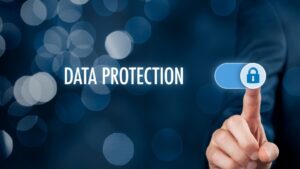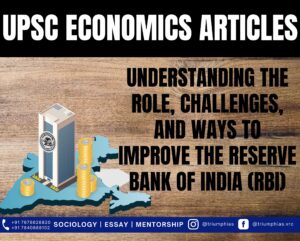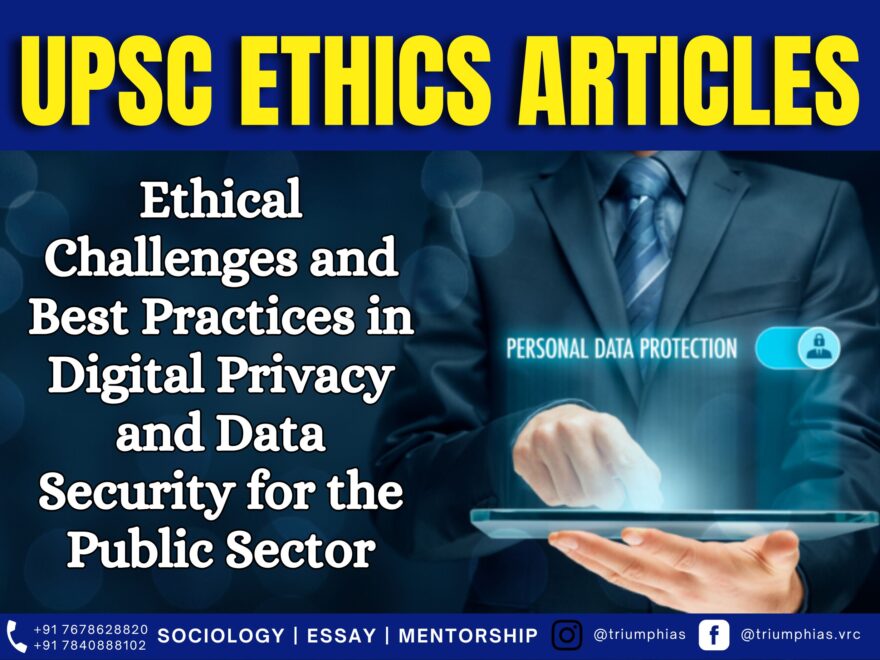Ethical Challenges Related to Digital Privacy and Data Security in the Public Sector
(Relevant for Ethics, Integrity and Aptitude)
(Reference: Static Part)

Ethical Challenges Related to Digital Privacy and Data Security in the Public Sector
Digital privacy and data security represent crucial ethical concerns that emerge as technology and data play increasingly prominent roles in governance. Within the public sector, there is the collection, processing, and sharing of diverse data types sourced from citizens, businesses, and other entities. These activities serve various objectives, including service provision, policy formulation, law enforcement, and national security. Nevertheless, these data practices also present substantial challenges to the rights and well-being of data subjects and the broader public.
Ethical challenges related to digital privacy and data security
-
Intrusion into Digital Privacy
Data Collection and Surveillance: Governments frequently amass extensive quantities of personal data from their citizens, citing diverse objectives like public services, law enforcement, and health management. The indiscriminate gathering and surveillance of personal data elicit concerns regarding individual privacy violations.
Social Profiling: Utilizing advanced data analytics and algorithms can result in social profiling, wherein individuals get categorized based on their online actions and personal details. Such profiling can culminate in discriminatory practices and biased decision-making.
Cybersecurity Vulnerabilities: Given the sensitive nature of the data it holds, the public sector becomes a primary target for cyberattacks. Ensuring robust cyber security measures remains imperative for safeguarding citizens’ data. Ethical quandaries emerge when governments fail to adequately shield this data.
Data Breaches: Instances of data breaches, entailing the exposure of sensitive information, can inflict severe repercussions on individuals. Ethical predicaments surface when governments are found culpable for such breaches, leading to a breach of trust.
- Transparency and Accountability:
Lack of Transparency: The opacity enveloping data collection, storage, and utilization by government entities can breed suspicions of data misuse or abuse. Guaranteeing transparency within these processes becomes vital for nurturing trust.
Accountability Shortcomings: When data misuse occurs within the public sector, ascertaining responsibility can prove challenging, owing to the intricacies of government hierarchies. Ethical issues arise when those accountable for data breaches or privacy violations escape consequences.
- Biometrics and Emerging Technologies:
Biometric Data: The utilization of biometrics for identification purposes can heighten security but simultaneously triggers ethical concerns regarding the potential mishandling of such personal data.
Artificial Intelligence (AI): The integration of AI into public sector operations can engender ethical dilemmas linked to algorithmic bias and decision-making processes. Ensuring equity and fairness in these contexts poses a significant challenge.
What is the need of Ethical data management?
For Corporations:
- Earning their customers’ trust is pivotal, as it directly influences their overall success.
- Reducing the incidence of breaches in data management laws can decrease the likelihood of an organization facing penalties. For instance, in the case of Face book’s recent data breach, if it is found to violate the EU General Data Protection Regulation (GDPR), they could incur fines amounting to 4% of their global revenue.
- Promoting a level playing field is important, as entities with larger data pools may otherwise have the potential to unfairly impact competition within the marketplace.
For Government:
- Strengthening people’s faith in democratic ideals like liberty, equality, and justice is crucial. This helps ensure that the state is not perceived as a ‘police state.’
- An ethics-driven approach to Data Governance promotes a comprehensive understanding of data protection laws and the responsible use of technology that generates, analyzes, and disseminates data.
- Clearly articulating and disseminating principles and practices can foster honest and appropriate behaviors.
What should be the Approach for Ethics in Data Management and Governance
- Companies must extend their focus beyond data security and privacy to ensure the ethical handling of data both within and outside the organization.
- Data Governance programs could benefit from ethics frameworks provided by government entities and/or the broader public sector. For instance, the UK’s Department for Digital, Culture, Media & Sport has developed a framework as part of its National Data Strategy.
- It is essential to establish collective standards and ethical guidelines governing data collection and utilization.
- Every organization should appoint a ‘Chief Ethics Officer’ to oversee ethical considerations related to data.
- Regular security training and awareness programs for employees within the organization can enhance their understanding of associated risks, thereby reducing the likelihood of errors resulting from ignorance.
Benefit of maintaining ethical approach in data management
- It will maintain the trust of individuals in the organization.
- This approach aids in gaining a deeper comprehension of the impacts of technology, data workflows, data sharing, and their ethical and real-world implications.
- This approach would reinstate the fragile equilibrium between controls, rights, responsibilities, and procedures, ultimately instilling confidence in data.
- It fosters transparency and guarantees accountability in the collection, storage, and processing of data.
Government initiatives in data privacy
|
The increasing use of technology and data in governance presents significant ethical challenges related to digital privacy and data security in the public sector. Addressing these ethical challenges requires comprehensive legislation, transparent policies, cyber security investments, and ongoing scrutiny to ensure that the benefits of digital governance are realized while safeguarding citizens’ rights and privacy. The Digital Personal Data Protection Act of 2023 establishes a framework for the processing of personal data in India is a significant step in this direction.
Frequently Asked Questions:
Question: Discuss the ethical implications of digital privacy in the context of modern governance systems.
Answer: Ethical implications include intrusion into individual privacy through mass data collection and surveillance, potential for social profiling and discrimination, as well as issues of transparency and accountability.
Question: How can ethical data management foster trust in the public sector?
Answer: Ethical data management ensures the responsible collection, storage, and use of data, thereby increasing transparency, accountability, and ultimately, public trust in governmental operations.
Question: Evaluate the role of emerging technologies like AI and biometrics in shaping ethical challenges in the public sector.
Answer: Emerging technologies like AI and biometrics can enhance efficiency and security but also raise ethical concerns, such as algorithmic bias, social profiling, and potential misuse of sensitive biometric data.
Question: What is the significance of government initiatives like India Stack in digital governance?
Answer: Government initiatives like India Stack provide a secure and privacy-respecting infrastructure that enhances access to public and private services, thus creating a more robust and safer digital environment.
Question: How do data localization policies impact digital privacy and data security?
Answer: Data localization policies can enhance control over domestic data, improving its security. However, they may also raise concerns about government surveillance and restrict international data flow.
Related Blogs …
 |
 |
To master these intricacies and fare well in the Sociology Optional Syllabus, aspiring sociologists might benefit from guidance by the Best Sociology Optional Teacher and participation in the Best Sociology Optional Coaching. These avenues provide comprehensive assistance, ensuring a solid understanding of sociology’s diverse methodologies and techniques.
Ethical Data Management, Digital Privacy, Data Security, Public Sector, Cybersecurity, Transparency, Accountability, Government Initiatives, India’s Data Protection Act 2023, Artificial Intelligence, Biometrics, Social Profiling, Cyberattacks, Data Breach

Choose The Best Sociology Optional Teacher for IAS Preparation?
At the beginning of the journey for Civil Services Examination preparation, many students face a pivotal decision – selecting their optional subject. Questions such as “which optional subject is the best?” and “which optional subject is the most scoring?” frequently come to mind. Choosing the right optional subject, like choosing the best sociology optional teacher, is a subjective yet vital step that requires a thoughtful decision based on facts. A misstep in this crucial decision can indeed prove disastrous.
Ever since the exam pattern was revamped in 2013, the UPSC has eliminated the need for a second optional subject. Now, candidates have to choose only one optional subject for the UPSC Mains, which has two papers of 250 marks each. One of the compelling choices for many has been the sociology optional. However, it’s strongly advised to decide on your optional subject for mains well ahead of time to get sufficient time to complete the syllabus. After all, most students score similarly in General Studies Papers; it’s the score in the optional subject & essay that contributes significantly to the final selection.
“A sound strategy does not rely solely on the popular
Opinion of toppers or famous YouTubers cum teachers.”
It requires understanding one’s ability, interest, and the relevance of the subject, not just for the exam but also for life in general. Hence, when selecting the best sociology teacher, one must consider the usefulness of sociology optional coaching in General Studies, Essay, and Personality Test.
The choice of the optional subject should be based on objective criteria, such as the nature, scope, and size of the syllabus, uniformity and stability in the question pattern, relevance of the syllabic content in daily life in society, and the availability of study material and guidance. For example, choosing the best sociology optional coaching can ensure access to top-quality study materials and experienced teachers. Always remember, the approach of the UPSC optional subject differs from your academic studies of subjects. Therefore, before settling for sociology optional, you need to analyze the syllabus, previous years’ pattern, subject requirements (be it ideal, visionary, numerical, conceptual theoretical), and your comfort level with the subject.
This decision marks a critical point in your UPSC – CSE journey, potentially determining your success in a career in IAS/Civil Services. Therefore, it’s crucial to choose wisely, whether it’s the optional subject or the best sociology optional teacher. Always base your decision on accurate facts, and never let your emotional biases guide your choices. After all, the search for the best sociology optional coaching is about finding the perfect fit for your unique academic needs and aspirations.
To master these intricacies and fare well in the Sociology Optional Syllabus, aspiring sociologists might benefit from guidance by the Best Sociology Optional Teacher and participation in the Best Sociology Optional Coaching. These avenues provide comprehensive assistance, ensuring a solid understanding of sociology’s diverse methodologies and techniques. Sociology, Social theory, Best Sociology Optional Teacher, Best Sociology Optional Coaching, Sociology Optional Syllabus.
Best Sociology Optional Teacher, Sociology Syllabus, Sociology Optional, Sociology Optional Coaching, Best Sociology Optional Coaching, Best Sociology Teacher, Sociology Course, Sociology Teacher, Sociology Foundation, Sociology Foundation Course, Sociology Optional UPSC, Sociology for IAS,
Follow us :
🔎 https://www.instagram.com/triumphias
🔎https://www.youtube.com/c/TriumphIAS
https://t.me/VikashRanjanSociology
Find More Blogs
|
Scope of the subject and comparison with other social sciences |
|||
|
|
|
|
Modernity and social changes in Europe |


